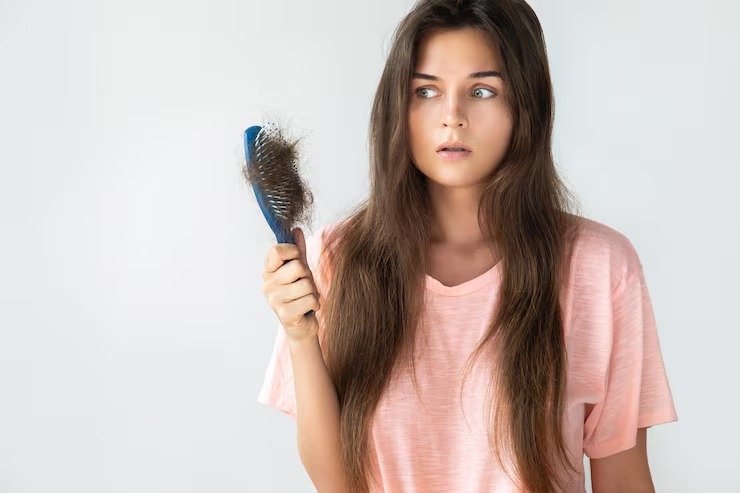
Hair loss often raises anxiety—seeing more strands in the hairbrush or shower makes many of us wonder: Is something wrong with my health? The answer is: not always. While hair shedding can be a signal, in many cases it’s a natural process. Here’s how to tell the difference, what medical issues to watch out for, and when to act.
What’s Normal vs What’s Concerning
- Normal shedding: It’s typical to lose about 50 to 100 hairs a day, as new hairs grow to replace the ones that fall.
- Gradual thinning with age: Over time, hair density tends to reduce naturally; in men, this might show as a receding hairline, and in women as diffuse thinning, especially near the crown.
- Red flags: Sudden hair loss, patchy bald spots, or heavy, continuous shedding may point toward an underlying issue.
Medical Conditions That Can Cause Hair Loss
If hair loss is more than just seasonal or genetic, several health‐related factors may play a role:
- Hormonal imbalances: Thyroid problems, menopause, pregnancy, and other hormone fluctuations can disrupt hair growth cycles.
- Autoimmune disorders: Conditions like alopecia areata cause the immune system to attack hair follicles, leading to patchy bald patches.
- Nutritional deficiencies: Inadequate protein intake, iron deficiency, low vitamin D or deficiencies in B vitamins are common causes of hair weakening and increased shedding.
- Medications & treatments: Certain drugs (for cancer, heart disease, depression, etc.) and treatments like chemotherapy are known to cause hair loss.
- Stress & trauma: Emotional or physical stress (e.g. illness, surgery) can trigger telogen effluvium, a condition where more hairs than usual enter the shedding phase.
- Scalp disorders / skin conditions: Infections, psoriasis, dermatitis, or fungal issues affecting the scalp can damage follicle health.
Non-Health Factors That Also Matter
Hair loss isn’t always a medical issue. Some common non-health causes include:
- Genetics / hereditary factors: Male pattern baldness and female pattern thinning are largely inherited.
- Ageing: As we grow older, hair follicles slow their growth cycles, resulting in thinner hair.
- Hair care practices: Tight hairstyles, harsh chemical treatments, overuse of heat styling tools, or aggressive brushing can all contribute to hair breakage or traction alopecia.
- Environmental damage: Factors like intense sun exposure, pollutants, and chlorine can weaken the hair shaft and promote breakage.
When to Seek Medical Advice
You should see a dermatologist or healthcare provider if:
- Hair loss is rapid, patchy, or persistent over several weeks.
- The scalp is inflamed, red, itchy, scaly, or painful.
- Hair loss comes with other symptoms: fatigue, changes in weight, skin/nail changes.
- You suspect a systemic condition (e.g. thyroid, autoimmune disorder, nutrient deficiency).
Early diagnosis can help identify treatable causes (like thyroid issues or nutrient deficiencies) before more permanent damage occurs.
Treatment Options & Approaches
Depending on the cause, there are multiple paths to manage or restore hair:
- Medical treatments: These may include minoxidil, finasteride (for suitable candidates), or other dermatologist-prescribed therapies.
- Procedures: Hair transplant surgeries, PRP (platelet-rich plasma) therapy, or other regenerative techniques may be considered in more permanent or genetic forms of hair loss.
- Lifestyle & nutrition: A balanced diet rich in protein, iron, vitamins D and B complex, plus a healthy lifestyle, supports hair health.
- Gentle hair care: Avoid harsh treatments, tight styles, and heat damage. Use mild shampoos and conditioners.
- Stress management: Practices like meditation, regular exercise, good sleep, and stress reduction techniques can positively affect hair health.
Final Thoughts
Hair loss does not always mean you are unhealthy. In many cases, it’s just part of natural aging or genetics. But when it’s sudden, heavy, or accompanied by other symptoms, it’s wise to consult a professional. The sooner you assess, the better your chances of addressing reversible causes or preventing further loss.
This article was originally published on Capilclinic and has been republished here with permission.
Related Reads
- What Are You Missing About Cheap Assignment Writing Help?
- Affordable Sam and Colby Merch: Best Budget XPLR Finds
- California to North Carolina Vehicle Shipping: Fast, Safe, and Affordable with Rapid Auto Shipping
- Is a Small Gaming PC Right for You? Your Guide to Compact Gaming
- How do I Apply for an Internship in Dubai as an International student?


